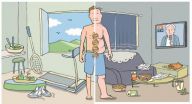(Press-News.org) In our constantly connected, information-rich society, some drivers are jumping at the chance to let auto insurance companies monitor their driving habits in return for a handsome discount on their premiums.
What these drivers may not know is that they could be revealing where they are driving, a privacy boundary that many would not consent to cross.
A team of Rutgers University computer engineers has shown that even without a GPS device or other location-sensing technology, a driver could reveal where he or she traveled with no more information than a starting location and a steady stream of data that shows how fast the person was driving.
Insurance companies and customers both have incentive to monitor driving speeds, said Janne Lindqvist, assistant professor in the Department of Electrical and Computer Engineering at Rutgers. Drivers who avoid jackrabbit starts and sudden stops are typically lower-risk drivers, and insurance companies benefit by rewarding such behavior. So some companies are offering lower premiums to customers who install a device that constantly measures, records and reports their speed.
"The companies claim this doesn't compromise privacy, because all they are collecting is your speed, not your location," said Lindqvist, who is also a member of the university's Wireless Information Network Laboratory, or WINLAB. "But we've shown that speed data and a starting point are all we need to roughly identify where you have driven."
Reproducing an exact driving path from this limited and basic information is challenging – and it is less precise than using GPS or cellular signal tracking measurements. But with the researchers' approach, sometimes even one drive is enough to reveal the person's destination within a third of a mile or less.
The technique, dubbed "elastic pathing," predicts pathways by seeing how speed patterns match street layouts. Take for example, a person whose home is at the end of a cul-de-sac a quarter mile from an intersection. The driver's speed data would show a minute of driving at up to 30 miles per hour to reach that intersection. Then if a left turn leads the driver to a boulevard or expressway but a right turn leads to a narrow road with frequent traffic lights or stop signs, you could deduce which way the driver turned if the next batch of speed data showed a long stretch of fast driving or a slow stretch of stop-and-go driving. By repeatedly matching speed patterns with the most likely road patterns, the route and destination can be approximated.
Lindqvist doesn't claim that insurance companies are actually processing the data to reveal locations. The techniques he and his colleagues are exploring are in their early stages and are not obvious to implement. Insurance companies likely wouldn't benefit from knowing this information, especially if it is costly to obtain. But, he believes, it's conceivable that law enforcement agencies could subpoena this information and run these kinds of complex analyses if they want to find out where someone has driven.
"I'm not saying that insurance companies should not monitor speeds like this," he said. "I'm just saying that they should not imply that their speed data collection is privacy preserving. In any case, collecting just speed data compared to GPS data is a better practice since the locations are not directly available."
To test how well the elastic pathing technique worked, Lindqvist and his colleagues examined data from six drivers in New Jersey traveling to 46 different destinations over 240 trips, and from 21 drivers in Seattle over 691 trips. For more than 20 percent of the trips, the technique predicted the final destination within a little less than one-third of a mile from the actual endpoint.
"In time, we expect improvements will be made to our initial approach," he said. "The data, once collected, do not go away, and improvements may make it possible to plumb more private information." Lindqvist suggests that insurance companies consider alternatives to collecting speedometer readings that can afford better privacy protection.
Lindqvist's doctoral student, Xianyi Gao, will present the results of the team's research at the 2014 ACM International Joint Conference on Pervasive and Ubiquitous Computing (UbiComp 2014) Sept. 13-17 in Seattle. Other student contributors include Bernhard Firner, Shridatt Sugrim, Victor-Kaiser Pendergrast, and Yulong Yang. The National Science Foundation funded the research.
INFORMATION:
Further information about the project can be found at http://elasticpathing.org. A video demonstrating the technique is available at https://www.youtube.com/watch?v=TI6TmwwURoU.
Rutgers researchers show that how fast you drive might reveal exactly where you are going
Computer experts find speed data collected by some insurance companies could compromise a customer's privacy
2014-08-11
ELSE PRESS RELEASES FROM THIS DATE:
School violence, gun-related injury among top 10 child health concerns nationally
2014-08-11
ANN ARBOR, Mich. – Childhood obesity remains the top health concern for children in 2014, but when asked about national concerns, adults put school violence and gun-related injuries in the top 10, according to a new University of Michigan C.S. Mott Children's Hospital National Poll on Children's Health.
In the poll's annual top 10 list, a nationwide sample of adults were asked to identify the biggest health concerns for kids in their communities, as well as kids nationwide. Overall, childhood obesity is rated at the top of both lists: 29 percent of adults said obesity ...
Inequality -- a key issue of economic research
2014-08-11
In the aftermath of the global financial crisis and the ensuing economic and political disruptions, inequality has re-emerged as a central focus of public debate. The drivers of rising inequality of income and wealth and the various scientific models for counteractive measures will be among the central topics debated among 17 Nobel Laureates in Economic Sciences and approximately 450 aspiring young economists from more than 80 countries in Lindau, Germany, next week. The 5th Lindau Meeting on Economic Sciences will bring them together for a unique dialogue across generations, ...
Clues emerge to genetic architecture of cognitive abilities in children
2014-08-11
How genes affect intelligence is complicated. Multiple genes, many yet unknown, are thought to interact among themselves and with environmental factors to influence the diverse abilities involved in intelligence.
A large new genetic study in thousands of children and adolescents offers early glimpses of the overall patterns and connections among cognitive abilities such as language reasoning, reading skill and types of memory. The findings may lead to new tools in understanding human cognitive development and neuropsychiatric disorders.
"This research is one of the ...
More intensive interventions needed to combat severe obesity in teens
2014-08-11
New Rochelle, NY, August 11, 2014 -- Nearly 6% of all children and teens in the U.S. are severely obese, and the prevalence of severe obesity is increasing faster than that of moderate obesity or overweight. This is an alarming trend as about 90% of these youths will grow up to be obese adults. The serious health problems associated with severe obesity and the poor long-term prognosis and quality of life projected for these children and teens demand more serious consideration of safe and effective treatment options that go beyond diet and lifestyle modifications, as proposed ...
Pairing old technologies with new for next-generation electronic devices
2014-08-11
UCL scientists have discovered a new method to efficiently generate and control currents based on the magnetic nature of electrons in semi-conducting materials, offering a radical way to develop a new generation of electronic devices.
One promising approach to developing new technologies is to exploit the electron's tiny magnetic moment, or 'spin'. Electrons have two properties – charge and spin – and although current technologies use charge, it is thought that spin-based technologies have the potential to outperform the 'charge'-based technology of semiconductors for ...
Sugary bugs subvert antibodies
2014-08-11
A lung-damaging bacterium turns the body's antibody response in its favor, according to a study published in The Journal of Experimental Medicine.
Pathogenic bacteria are normally destroyed by antibodies, immune proteins that coat the outer surface of the bug, laying a foundation for the deposition of pore-forming "complement" proteins that poke lethal holes in the bacterial membrane. But despite having plenty of antibodies and complement proteins in their bloodstream, some people can't fight off infections with the respiratory bacterium Pseudomonas aeruginosa. And chronic ...
Tackling liver injury
2014-08-11
A new drug spurs liver regeneration after surgery, according to a paper published in The Journal of Experimental Medicine.
Liver cancer often results in a loss of blood flow and thus oxygen and nutrients to the liver tissue, resulting in deteriorating liver function. Although the diseased part of the liver can often be surgically removed, the sudden restoration of blood flow to the remaining liver tissue can trigger inflammation—a process known as ischemia reperfusion injury (IRI). IRI results in part from the deposition of immune proteins called complement on the surface ...
'Seeing' through virtual touch is believing
2014-08-11
Visual impairment comes in many forms, and it's on the rise in America.
A University of Cincinnati experiment aimed at this diverse and growing population could spark development of advanced tools to help all the aging baby boomers, injured veterans, diabetics and white-cane-wielding pedestrians navigate the blurred edges of everyday life.
These tools could be based on a device called the Enactive Torch, which looks like a combination between a TV remote and Captain Kirk's weapon of choice. But it can do much greater things than change channels or stun aliens.
Luis ...
Aberrant mTOR signaling impairs whole body physiology
2014-08-11
The protein mTOR is a central controller of growth and metabolism. Deregulation of mTOR signaling increases the risk of developing metabolic diseases such as diabetes, obesity and cancer. In the current issue of the journal Proceedings of the National Academy of Sciences, researchers from the Biozentrum of the University of Basel describe how aberrant mTOR signaling in the liver not only affects hepatic metabolism but also whole body physiology.
The protein mTOR regulates cell growth and metabolism and thus plays a key role in the development of human disorders. In the ...
Not only in DNA's hands
2014-08-11
Blood stem cells have the potential to turn into any type of blood cell, whether it be the oxygen-carrying red blood cells, or the many types of white blood cells of the immune system that help fight infection. How exactly is the fate of these stem cells regulated? Preliminary findings from research conducted by scientists from the Weizmann Institute and the Hebrew University are starting to reshape the conventional understanding of the way blood stem cell fate decisions are controlled thanks to a new technique for epigenetic analysis they have developed. Understanding ...
LAST 30 PRESS RELEASES:
New ‘scimitar-crested’ Spinosaurus species discovered in the central Sahara
“Cyborg” pancreatic organoids can monitor the maturation of islet cells
Technique to extract concepts from AI models can help steer and monitor model outputs
Study clarifies the cancer genome in domestic cats
Crested Spinosaurus fossil was aquatic, but lived 1,000 kilometers from the Tethys Sea
MULTI-evolve: Rapid evolution of complex multi-mutant proteins
A new method to steer AI output uncovers vulnerabilities and potential improvements
Why some objects in space look like snowmen
Flickering glacial climate may have shaped early human evolution
First AHA/ACC acute pulmonary embolism guideline: prompt diagnosis and treatment are key
Could “cyborg” transplants replace pancreatic tissue damaged by diabetes?
Hearing a molecule’s solo performance
Justice after trauma? Race, red tape keep sexual assault victims from compensation
Columbia researchers awarded ARPA-H funding to speed diagnosis of lymphatic disorders
James R. Downing, MD, to step down as president and CEO of St. Jude Children’s Research Hospital in late 2026
A remote-controlled CAR-T for safer immunotherapy
UT College of Veterinary Medicine dean elected Fellow of the American Academy of Microbiology
AERA selects 34 exemplary scholars as 2026 Fellows
Similar kinases play distinct roles in the brain
New research takes first step toward advance warnings of space weather
Scientists unlock a massive new ‘color palette’ for biomedical research by synthesizing non-natural amino acids
Brain cells drive endurance gains after exercise
Same-day hospital discharge is safe in selected patients after TAVI
Why do people living at high altitudes have better glucose control? The answer was in plain sight
Red blood cells soak up sugar at high altitude, protecting against diabetes
A new electrolyte points to stronger, safer batteries
Environment: Atmospheric pollution directly linked to rocket re-entry
Targeted radiation therapy improves quality of life outcomes for patients with multiple brain metastases
Cardiovascular events in women with prior cervical high-grade squamous intraepithelial lesion
Transplantation and employment earnings in kidney transplant recipients
[Press-News.org] Rutgers researchers show that how fast you drive might reveal exactly where you are goingComputer experts find speed data collected by some insurance companies could compromise a customer's privacy






